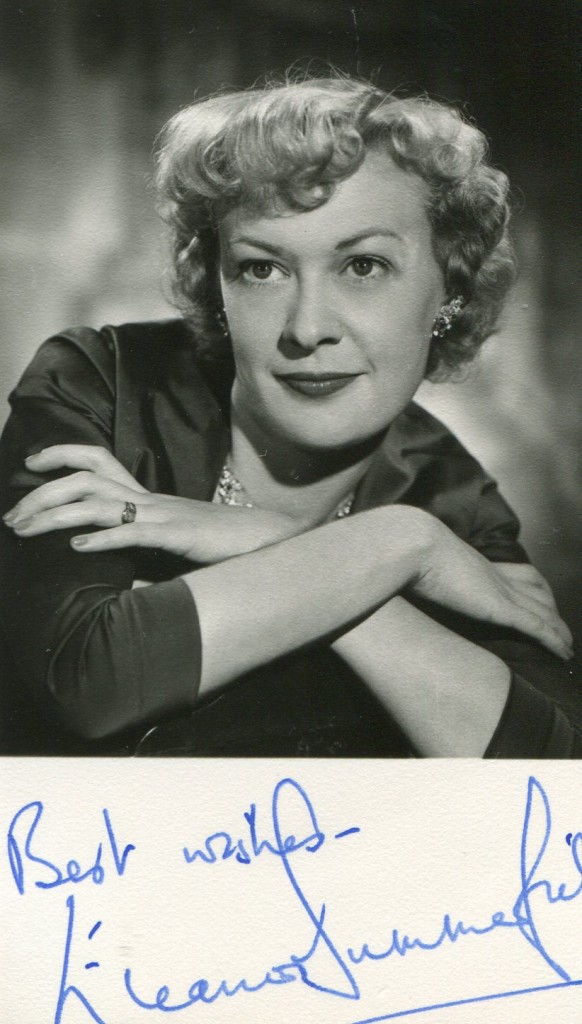Eleanor Summerfield was a stalwart character actress who was very profilic in British films in the 1940’s and 50’s. She made her film debut in 1947 in “Take My Life”. Her other films include “Laughter in Paradise”, “Scrooge”, “The Last Page”, “Mandy”, “Street Corner”, “Lost” and “A Cry From the Streets”. She was married to actor Leonard Sachs and is the mother of actor Robin Sachs. Eleanor Summerfield died in 2001 at the age of 80.
“Guardian” obituary:
Film, theatre and television actor as adept at drawing tears from her audience as laughs
Eric Shorter
The actor Eleanor Summerfield, who has died aged 80, shed some early comic light on the earnest, dark and intellectually pretentious plays of the postwar poetic revival in London theatre. While the fashion for verse drama was later to bring Edith Evans in Christopher Fry’s The Dark Is Light Enough, Laurence Olivier in that author’s Venus Observed and Alec Guinness in TS Eliot’s The Cocktail Party, in 1945 E Martin Browne was still struggling to re-establish the movement at the tiny Mercury Theatre in Notting Hill. For audiences and critics alike, trying to fathom the meaning of Ronald Duncan’s masque and anti-masque in verse called This Way to the Tomb! (which the critic James Agate sneeringly retitled Turn Right for the Crematorium) was no joke.
With such “types” on stage as the Man of Culture, the Mobile Worker, the Announcer to the Astral Group, the Postcard Seller and an Old Man, it was the Girl of Leisure who caught the eye: a tallish, blue-eyed blonde with quizzical, soaraway eyebrows. Here was an apparently natural comedienne, and when Duncan’s symbolic novelty with music by Benjamin Britten transferred to the West End, Eleanor Summerfield took a second role – that of Lechery. By then, Browne had found another dramatist-in-verse and another role for Summerfield – Lil in Anne Ridler’s The Shadow Factory – but it was as Doto in Christopher Fry’s A Phoenix Too Frequent that the actor came to pro The Fry one-acter was set, characteristically, in an underground tomb near Ephesus, where a widow proposes to mourn her dead husband by fasting to death. Doto seems ready to follow her mistress to the grave, except that after a while – and a lot of hazy chit-chat – she finds herself doting not on her late master but on living men.
While Fry took credit for his wry little joke, the audience took away a vivid memory of Summerfield the comedienne. Her acting was likened by one critic to a “slightly distorted Greek vase painting”; for another she proved a “most absurd and cheerful companion”. Cheer and absurdity went on to amuse – and sometimes amaze – audiences for the rest of Summerfield’s career in television, cinema, theatre and radio. Unsurprisingly, once her comic instinct had been confirmed, the Rada-trained Summerfield turned away from verse drama towards the kind of verse that began to flourish at what became her spiritual home, the Players’ Theatre Club, beneath the arches at Charing Cross. There, verse was not only sung, but also came in rhyming couplets in homage to Queen Victoria and the music hall. Summerfield was to marry the man who ran the place, Leonard Sachs, later known to television audiences as chairman of The Good Old Days. Although Summerfield never left the theatre, it was to be another 40-odd years before the classical stage realised what a talent it had lost. It wasn’t until 1989, as Lady Wishfort in Congreve’s The Way of the World for the Cambridge Theatre Company at the Young Vic, that her theatrical talent proved itself again. Instead of playing Wishfort as the comically raddled and randy old thing from a saucy seaside postcard, Summerfield made her ruefully self-aware, even to the point of pathos.
In most of her feature films, Summerfield came on as the light relief – the comic mother or the woman next door or the woman you could never get away from; and though at first television used her in the same spirit, she broke free, after a while – she said it took 40 plays – from typecasting. When, in 1956, she won a News Chronicle poll for readers’ favourite actresses, Summerfield complained that the BBC had never let her be anything other than a funny creature in one low comedy after another, while independent television had given her a chance to prove herself an all-rounder “who can make ’em cry all the better for having made them laugh the week before”.
Among these television credits were My Wife’s Sister, Down Came a Blackbird, The Two Charlies, Night Train to Surbiton, David Copperfield and The World of Wooster. Summerfield also enjoyed panel games such as Many a Slip, chaired by Roy Plomley, which lasted more than 15 years on Radio 4. Of the rest of her stage work, one might pick out her “delightful artifice and delicious aplomb” in a French marital comedy, Gooseberry Fool (Duchess, 1949) or, 10 years later, her vivacious fooling in an otherwise uninspiring Italian-type musical with Dickie Henderson and Frank Leighton, When In Rome . . . (Adelphi, 1959). Or, at the same theatre nine years earlier, something called Golden City. This was the extravagant heyday of London musical comedy, when a cast of 60 was normal. Set in South Africa during a 19th-century gold rush, John Tore’s show included a war dance choreographed by Robert Helpmann, but its treasure was Summerfield as strolling player from Victorian variety (echoes of her work at the Players’ Theatre). Amid the din, she had the hit song. With it she stilled the house – What More Is There to Say? was the title. Of Summerfield’s performance the stately critic JC Trewin wrote: “She is an artist.”
Leonard Sachs died in 1990. Eleanor Summerfield is survived by her two sons, Toby and Robin.
Eleanor Summerfield, actor, born March 7 1921; died July 13 2001.
The above “Guardian” obituary can also be accessed online here.


